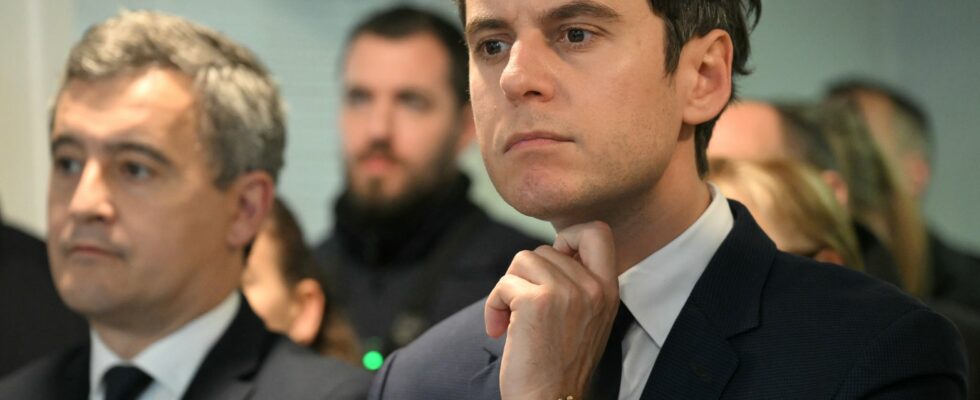A certain audacity has recently won over the ranks of former members of the government. As the presentation of the crucial 2025 budget approaches, Gabriel Attal and Gérald Darmanin took turns speaking out last weekend to criticize Michel Barnier’s proposed tax increases. Above all, they set out, respectively at 8 p.m. TF1 and in Les Echostheir own proposals to reduce the public deficit, which could explode to 7% of GDP in 2025 in the event of inaction.
The former tenant of Matignon is campaigning, for example, for a tightening of the screws on the 35-hour week for civil servants, while his colleague in the Assembly is advocating the end of this measure in the private sector and a move to “36 or 37 hours” in the private sector. the public sector. Everyone is positioning themselves on a return to unemployment insurance reform. Gérald Darmanin, for his part, defends a reform of public broadcasting, which could, according to his calculations, save 4 billion euros, or… the equivalent of the budget of all television channels and radio stations. public for 2024.
In what simply looks like a Lépine competition for budgetary measures, it was necessary to put things in order. On the eve of the presentation of the finance bill, Gabriel Attal, head of the Ensemble pour la République (EPR) deputies and several of his colleagues, including the former general rapporteur of the Budget, Jean-René Cazeneuve and the former member of the government Thomas Cazenave, presented, Wednesday October 9, a series of measures carried by their political group for the budget.
In his opening remarks, Gabriel Attal once again insisted on their disagreements with Michel Barnier on potential increases in charges for businesses. “Our fear is that the future budget will not include enough reforms and too many taxes with the risk of destabilizing our industries and the working middle class.” Among the proposals unveiled is notably the application of the aborted unemployment insurance reform, which could bring in, according to Macronist deputies, 4 billion euros. Regarding the 35 hours, the EPR elected officials want them to be respected in the communities. The latter will also have to participate in the budgetary effort. Parliamentarians also want to reduce daily allowances. Measures that the political group intends to pass via a series of amendments during the examination of the finance bill. Finally, a bill to strengthen the “anti-fraud arsenal” should be tabled by the end of the year.
Poorly placed to teach lessons
The approach may seem cheeky. It’s easy to forget that Gérald Darmanin and Gabriel Attal were in charge just a few weeks ago. Especially since the two elected officials have the common point of having been Ministers of Public Accounts. The first remained in post for three years, before taking charge of Beauvau. During his mandate, the public deficit will certainly have fallen from 2.8% of GDP in 2017 to 2.5% in 2018, but rose the following year to 3.1%. A shift sufficient to escape from the constraints set by the Maastricht Treaty – 3% deficit and a debt of 60% of GDP – and put France back in Brussels’ sights. The pandemic will then deliver the final blow.
As for Gabriel Attal, his time at Bercy to manage state funds was briefer – one year and two months. However, it was he who led the battle for the 2023 budget, promising “a phase of budgetary normalization after whatever the cost linked to Covid”. A text adopted forceps with forceps of 49.3. The political will displayed has in any case not been followed by the facts. In 2023, the public deficit slipped to 5.5%, compared to 4.8% in 2022, without any external economic shock. The fault, in particular, is lower tax revenue than expected.
No matter, the two former government figures today appear very poorly placed to give lessons in budgetary conduct. Michel Barnier was not mistaken. “Mr. Attal, I will be very attentive to your proposals for additional savings. Very attentive to deal with a deficit that I found when I arrived,” the Prime Minister playfully launched after his general policy declaration. To the point of integrating the measures suggested by his predecessor into the future budget?
.
